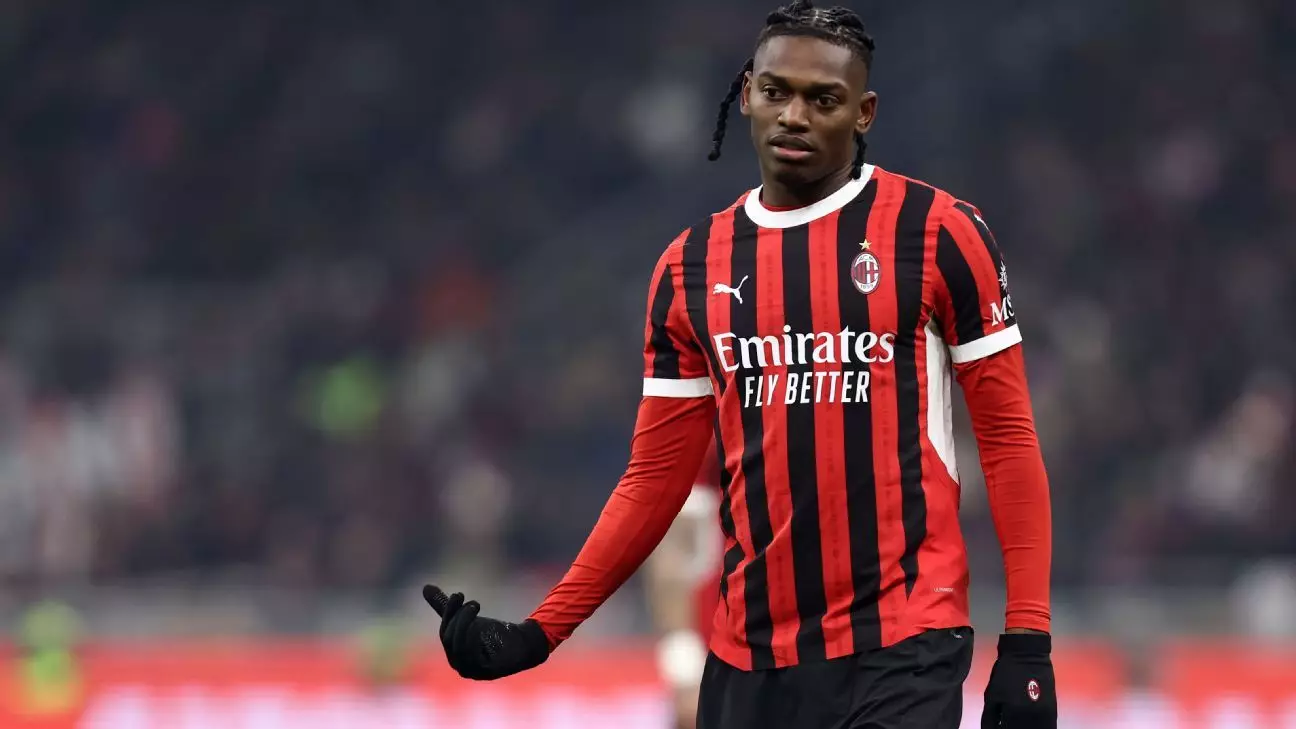In the dynamic arena of professional football, moving beyond mere rumors and sporadic negotiations, the pursuit of star players reveals a deeper narrative about ambition, financial muscle, and strategic vision. Barcelona’s current contemplation of Rafael Leão exemplifies this complexity. The Catalan giants are prepared to shell out over €70 million, including variables, for the Portuguese winger. This figure underscores Barcelona’s relentless desire to reclaim their status, especially in an era where domestic and European success hinges on signing marquee talents. However, their financial constraints complicate the situation, emphasizing that amidst glamor and lofty ambitions, economic prudence remains paramount.
Much like Barcelona, other elite clubs like Bayern Munich attempted to secure Leão but failed due to Milan’s reluctance, largely driven by the absence of European football for the Italian giants this season. This scenario highlights a pivotal reality: even with the deep pockets of top European clubs, the willingness to invest is often tempered by tangible factors like squad stability and long-term sustainability. The transfer fee acts as a symbol of a club’s project but is also a reflection of a broader strategic calculus. Clubs are increasingly aware that splurging on high-profile signings does not necessarily translate into guaranteed success, especially when the financial landscape is volatile. Therefore, these transfers are as much about signaling intent as they are about immediate on-field impact.
The Race for Rising Talents and Strategic Rebuilding
In stark contrast to the high-profile pursuit of established stars, the transfer market at the youth and emerging talent level encapsulates a different set of priorities: adaptability, future potential, and financial prudence. Arsenal’s pursuit of Viktor Gyökeres exemplifies this. The London club’s urgency to secure a new striker within two weeks reveals their desire to stabilize the attacking line ahead of a busy season. Yet, the protracted negotiations with Sporting CP reflect broader issues: the clash of valuation and club priorities. Arsenal appears willing to push for a deal, but frustration simmers over the lack of progress, hinting at how tactical negotiations can stretch out due to valuation disagreements.
Meanwhile, the transfer saga involving Benjamin Sesko demonstrates the delicate balance European clubs attempt to strike between valuation and necessity. While Leipzig values Sesko at upwards of £70 million, Arsenal seeks to negotiate around £60 million—an indication of a willingness to pay a premium, but not signing away the farm. Such negotiations mirror the market’s current mindset: clubs recognize the immense value of young offensive talent, yet are cautious about overextending financially. It’s a constant, strategic game of chess, where patience often pays dividends, especially as clubs gauge their long-term rebuilding plans against immediate needs.
Shifts in Power Dynamics and Football’s Financial Ecosystem
The transfer window also exposes the shifting power dynamics among clubs, with traditionally dominant teams like Manchester United and Liverpool playing a different game than their rivals. United’s signing of young defenders like Diego Leon reflects a strategic focus on youth development and squad depth, hinting at a longer-term vision rather than short-lived star purchases. Similarly, Liverpool’s interest in Orkun Kokcu underscores a broader emphasis on cultivating midfield versatility without resorting to the astronomical fees often associated with superstar signings.
On a broader level, financial muscle remains a defining factor. Clubs like Al-Hilal preparing “huge” bids for Victor Osimhen demonstrate how Middle Eastern clubs are challenging traditional European dominance by flexing their monetary muscles. Similarly, Napoli’s ongoing negotiations to hold onto key players amid tempting offers display the tension between ambition and reality. Financial considerations are also evident in Juventus’s dealings, where their willingness to offload Dusan Vlahović and seek a replacement signifies a club refocusing its core amidst ongoing tactical reassessment and economic constraints.
This interplay between financial power and strategic vision is forging new paradigms. Clubs are increasingly choosing targeted investments over wholesale spending, and players are aware that an ambitious club’s offer can often override market valuation. In this environment, transfers become a reflection of not only the immediate tactical needs but also an intricate chess match where reputation, monetary value, and future potential intertwine.
Future Trends and Ethical Considerations
Looking ahead, the transfer market’s trajectory emphasizes a blend of calculated risk-taking and caution. The ongoing negotiations for players like Nico Williams, who turned down Barcelona for a decade-long contract with Athletic Bilbao, reveal a trend towards stability and local identity, even amidst lure of bigger European clubs. Meanwhile, rising stars like Hernán López, finalizing loans or moves to South American clubs, highlight the club-dependent development pathways in modern football, with some leagues emphasizing nurturing talent over instant stardom.
However, these developments raise ethical questions about market saturation, player exploitation, and the long-term sustainability of such club-centric spending strategies. The blurred lines between sporting ambition and commercial interests reflect a landscape that must reckon with issues of inequality, financial fair play violations, and the social responsibility of clubs with vast revenues. As football’s economic ecosystem continues to evolve, the journey of each transfer serves as both a testament to human ambition and a mirror to the ethical dilemmas that come with unparalleled financial power.
The ongoing transfer saga is a microcosm of modern football’s broader transformation. It is a world driven by ambition, strategic foresight, and an unrelenting desire to excel—albeit within a complex matrix of financial realities and ethical questions. As clubs navigate this turbulent landscape, their decisions today will shape the future of football’s culture, competitiveness, and fairness.

